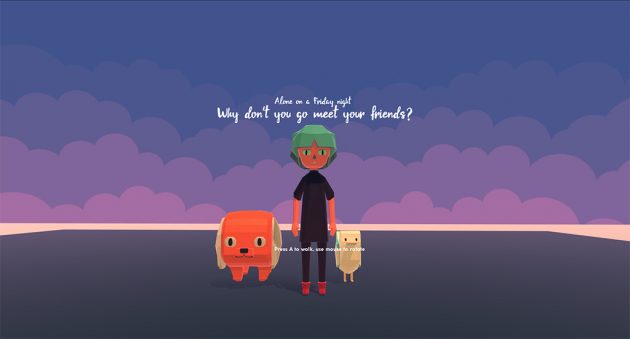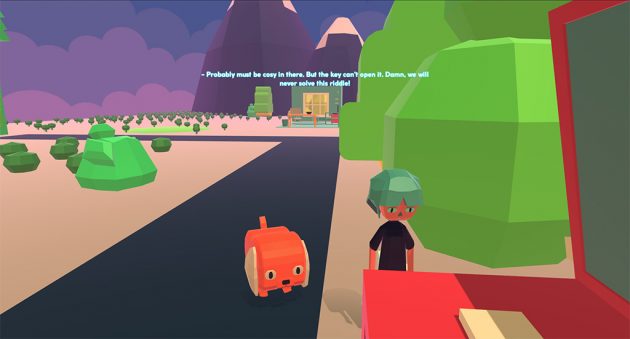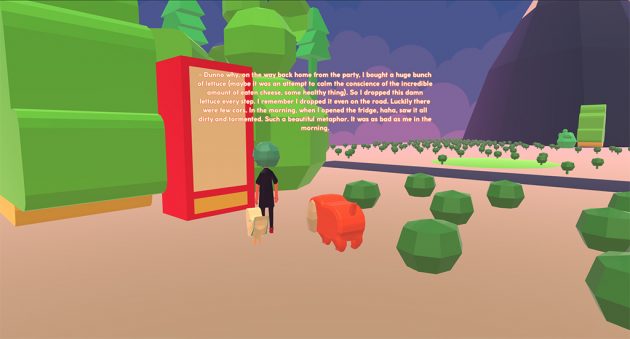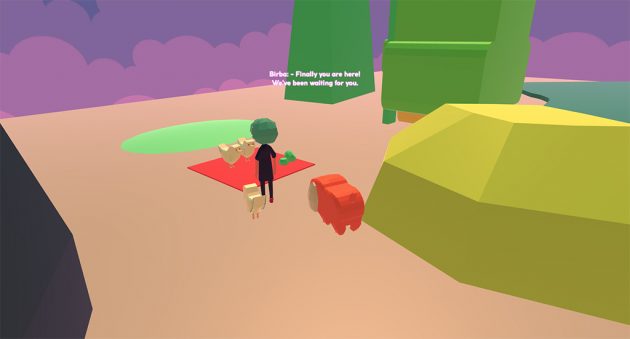Why don’t you meet your friends?

«Why don’t you meet your friends?» is a short video game, about three friends and their journey around low-poly, drifting in the air city. In fact, this simple painted location and the evening sky is all that the player can see. Dialogues and events occur randomly, driven by spontaneous interactions with objects and characters around. From building to building, player can explore the world, by walking through the city and try solve the secrets, hidden around.

Stories themselves and dialogues in «Why don’t you meet your friends?» mainly describe the events that happened before the game starts and which can not be seen, thereby the information about them is available only in the form of short descriptions.
Opening the game world and finding the quests, brings into the game not just order and purpose, but also a human meaning. By hiding the whole story from the player means to make him to feel its value and share with the characters their melancholy in front of the open world. Leaving the story of three friends behind, player can see a picture of the inhabited universe, which is filled with diverse of citizens with their own stories. Life and stories arises in this universe naturally, randomly.

In today’s world storytelling plays a central role in various types of media, such as novels, movies, television, theatre, and, most recent, video games. However, despite the fact that video games involve elements of storytelling from cinema and literature or theatre, like cut-scenes or text scenes on the screen, they have specific capabilities such as interactivity, navigation through the game space or interaction between game and player. By comparing video games and other more traditional narrative media, it becomes clear that for understanding the video games is necessary to develop special methods and evaluation criteria that are different from the techniques, adopted for the studies of academic disciplines.
The aim of this thesis was to analyse how video games tell stories. The main focus in the process of the game development was to try to experiment between game and play components in video games. The second aim was to explore the role of narrative in video games.

«Why don’t you meet your friends» at some level speculates about the concept of play and game. These principles, associated with the categories of accidental and specified, chaos and order, are showed as interconnected and transmitted to each other concepts. The concepts of game and play are extensively used in game studies and related disciplines, for example sociology, but one accepted definition does not exist. However, during the analysis of computer games it is useful to distinguish between two cases: when the player aims to win or when he finds pleasure only in the game process (1).
«Why don’t you meet your friends?», in contrast to a pure games doesn’t contains the area in which strict rules or the terms of victory and loss are clear. The element of game takes the unusually modest position. The presence of any kind of challenge is denied, and the emphasis is based on the purposeless walking around the location. The game process occurs accidentally, presented as a coincidence, like something, that steps aside from the process of game for a while and allows player just to play. The game becomes a discovery.
The theme of authorship returns us to the theme of interchange between game and play, but on meta level. The story in the game was created mostly for entertainment, and such activity can be marked with the term play.

«Why don’t you meet your friends» can be characterised as a «non game». The aesthetics of randomness is embodied so effectively, perhaps because of the laconism of instruments, that leads the player away from thinking about the story and especially the quest.

Why-don’t-you-meet-your-friends-Walkthrough
The complete documentation is available for reading as a PDF (https://files.cargocollective.com/c178085/Print.pdf) The final game is available for download on itch.io (https://mrnrexf.itch.io/go-meet-your-friends)
- Ludology Meets Narratology, Frasca, G (1999) (http://www.ludology.org/articles/ludology.htm)

